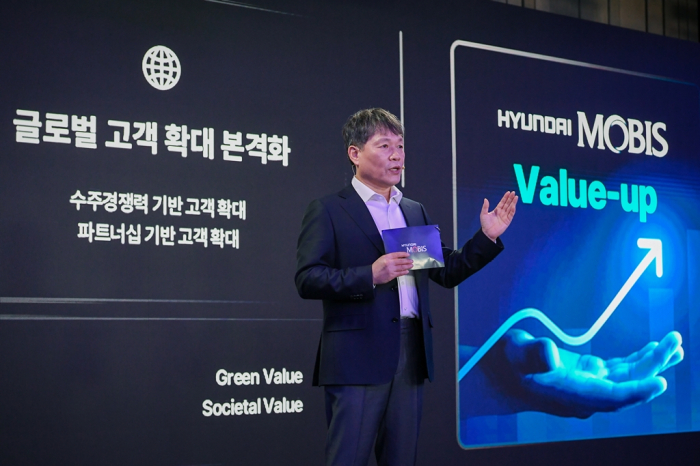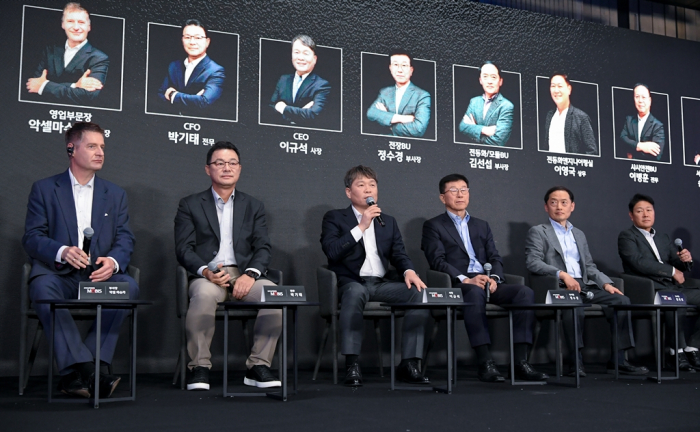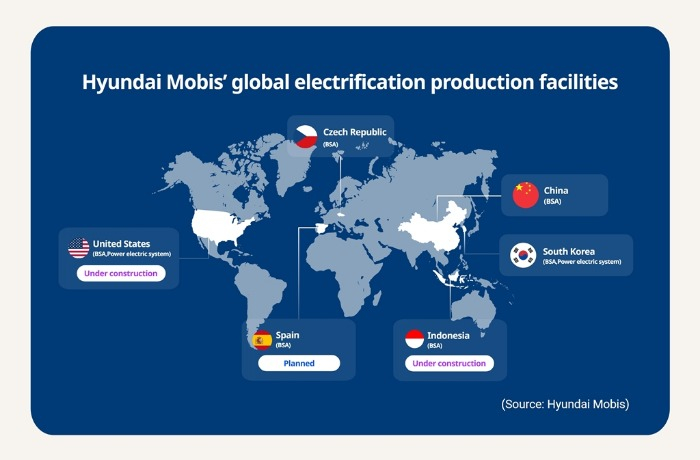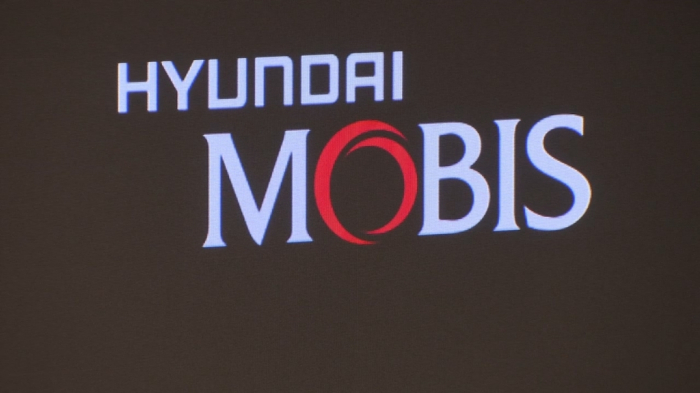Corporate strategy
Hyundai Mobis aims to expand non-captive sales to 40% as it goes global
At its inaugural CEO Investor Day, CEO Lee Gyu-suk also pledged to expand its drivetrain lineup to overcome the EV chasm
By Nov 19, 2024 (Gmt+09:00)
3
Min read
Most Read
LG Chem to sell water filter business to Glenwood PE for $692 million


KT&G eyes overseas M&A after rejecting activist fund's offer


Kyobo Life poised to buy Japan’s SBI Group-owned savings bank


StockX in merger talks with Naver’s online reseller Kream


Meritz backs half of ex-manager’s $210 mn hedge fund



South Korea’s top auto parts maker Hyundai Mobis Co. on Tuesday said it aims to boost non-Hyundai Motor Group affiliate sales to 40% of its total revenue by 2033 from the current 10% as part of its goal to become a global top three auto parts maker.
Hyundai Mobis, a subsidiary of Hyundai Motor Co., also said it targets an 8% average annual revenue growth rate while maintaining a 5-6% annual operating profit margin through 2027.
"We expect revenue growth driven by high-value-added core components to lead to qualitative growth based on profitability. Leveraging our competitive edge in advanced technologies, we aim to expand our global share of automotive parts sales to 40% by 2033 and solidify our position as a top three global parts supplier,” Chief Executive Lee Gyu-suk said at the company’s inaugural CEO Investor Day forum.
By achieving these goals, he said the company plans to raise its total shareholder return (TSR) ratio to more than 30% over the next three years from the current 20%, signaling a more aggressive shareholder return policy.

This figure is close to Hyundai Motor’s recently announced TSR of 35% and similar to another Hyundai Motor affiliate Kia Corp.'s target of around 30%.
TSR is a measure of financial performance, indicating the total amount an investor reaps from an investment – specifically, equities or shares of stock.
The Hyundai Mobis CEO said the company also plans to retire its treasury shares over the next three years.
The company also made public its business strategy announced at the 2024 CEO Investor Day on the Financial Supervisory Service website through a regulatory filing.
ADVANCED TECH, PROFITABILITY: TWO PILLARS OF VALUE-UP STRATEGY
Hyundai Mobis said its strategy to secure market-leading technological competitiveness is centered on effectively responding to the mobility trend of software-defined vehicles (SDVs), based on electrification.

The company said it aims to solidify its electrification leadership by developing products tailored to market demand, such as extended-range electric vehicles (EREVs) and affordable electric vehicle drive systems.
Hyundai Motor Group said in August that it is developing a next-generation powertrain, known as a range extender, for pickup trucks and sport utility vehicles amid the industry view that the current slowdown in electric vehicle sales or EV chasm could be protracted.
EREVs are similar to hybrid cars in that they have an internal combustion engine and a battery. Still, they are often regarded as EVs as the internal combustion engine is only used to charge the battery and a motor drives the wheels.
The automotive group plans to begin mass production of its EREVs in 2026.
TO EXPAND DRIVE SYSTEM LINEUP
Hyundai Mobis said it plans to expand its drive system lineups.
The CEO said the company will develop a 120 kW-class affordable drive system by 2025, targeting compact EV markets in Europe and India.
The new system, priced at about 70% of current mainstream 160 kW-class systems, is expected to increase the company’s market share in the segment, it said.
The development of a 250 kW-class drive system for large EVs is close to completion, and Hyundai Mobis is in sale talks with global automakers, according to the CEO.

The auto parts maker said it is strengthening partnerships through large-scale module supply agreements with automakers such as Volkswagen, Mercedes-Benz and Stellantis. It aims to eventually lower its sales dependence on affiliates Hyundai Motor and Kia to 60% from the current 90%.
Last month, it teamed up with German optics giant Zeiss to mass-produce next-generation automotive display holographic head-up displays (HUDs) by 2027.
ESG MANAGEMENT, CARBON NEUTRALITY GOALS
On Tuesday, Hyundai Mobis also outlined its commitment to responsible and sustainable mobility through its environmental, social and governance (ESG) initiatives.
The company said it plans to achieve a 35% renewable energy conversion rate by 2025.
It vowed to eliminate greenhouse gas emissions from all business operations worldwide by 2040 and achieve net zero throughout the company and its business partners in the supply chain by 2045.
Write to Jae-Fu Kim at hu@hankyung.com
In-Soo Nam edited this article.
More to Read
-
 AutomobilesHyundai Mobis, Zeiss to mass-produce holographic HUDs in 2027
AutomobilesHyundai Mobis, Zeiss to mass-produce holographic HUDs in 2027Oct 13, 2024 (Gmt+09:00)
2 Min read -
 Corporate strategyHyundai Motor cuts 2030 sales goals as EV chasm likely protracted
Corporate strategyHyundai Motor cuts 2030 sales goals as EV chasm likely protractedSep 19, 2024 (Gmt+09:00)
3 Min read -
 Electric vehiclesHyundai to develop EREV powertrain for electric pickup, Santa Fe, GV70
Electric vehiclesHyundai to develop EREV powertrain for electric pickup, Santa Fe, GV70Aug 13, 2024 (Gmt+09:00)
4 Min read -
 AutomobilesHyundai Mobis’ sustainability pledge for a better tomorrow
AutomobilesHyundai Mobis’ sustainability pledge for a better tomorrowAug 14, 2024 (Gmt+09:00)
3 Min read -
 Future mobilityElectrification, Hyundai Mobis’ growth engine for future mobility
Future mobilityElectrification, Hyundai Mobis’ growth engine for future mobilityAug 09, 2024 (Gmt+09:00)
3 Min read -
 AutomobilesHyundai Mobis unveils world’s first QL display for vehicles
AutomobilesHyundai Mobis unveils world’s first QL display for vehiclesNov 30, 2023 (Gmt+09:00)
3 Min read
Comment 0
LOG IN


